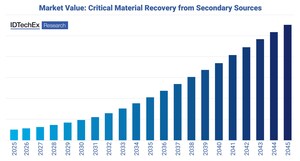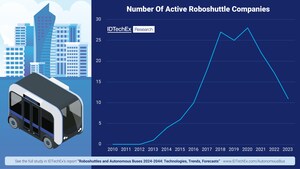BOSTON, July 10, 2023 /PRNewswire/ -- For many decades there has been an extensive amount of materials science R&D focussed on developing next-generation gas separation membranes. However, to date, the market is still dominated by those polymeric materials that initially gained commercial adoption in the late 20th century. As decarbonization market drivers present a new growth opportunity, these advanced materials are beginning to exit the lab and enter the market.
Gas separation membranes have already achieved commercial adoption in multiple applications, specifically nitrogen production, hydrogen recovery, natural gas treatment, and vapor recovery. The market is now entering a new growth phase. This is driven by key market factors, primarily renewable energy and decarbonization applications, and technology advancements responding to those needs. IDTechEx has launched a new market report,'Gas Separation Membranes 2023-2033', which provides a critical technology roadmap, company landscape and market outlook for this evolving industry.
There are a wide range of membrane materials, including polymeric, ceramic, metallic and composite variants. Beyond the material, it is also essential to consider both their form factor (such as hollow fiber or spiral wound) and, ultimately, how they are incorporated into the industrial process (including flow rate, operating temperature, and pressure difference) to meet the necessary separation requirements.
There is, of course, competition between membrane players, but the greater challenge in the field is in demonstrating the techno-economic viability for their solution against incumbent separation techniques. There are several technical limitations to existing commercial membranes, with the selectivity vs. permeability trade-off and lifetime in real-world environments being two prominent areas.
Polymer membranes, including cellulose acetate, polyimide and polysulfone, dominate the current market. Many of these will be at the forefront of some of the key growth areas, such as biogas upgrading, but for other emerging applications, the industry will need to explore different system designs and/or utilize materials pushing the Robeson upper bounds to gain any market share.
IDTechEx breaks these advancements into two areas: next-generation materials and hybrid processes. The latter can make use of commercial membranes but does not use them in isolation; instead, there is a large amount of activity looking to incorporate membranes alongside other separation techniques (such as cryogenic and membrane separation units used in tandem) within a novel integrated design, or under different conditions.
There remains an extensive amount of R&D, from both academia and industry, in exploring advanced materials for gas separation membranes. Many of these developments are progressing in their technology and manufacturing readiness and are beginning to gain some commercial traction. In the polymeric space, there are numerous advancements for both direct material use or inclusion as part of a composite, the latter seeing some key developments in both thin-film composite (TFC) membranes and mixed matrix membranes (MMM). There is a wide range of polymer science developments but fixed site carriers (FSC), polymers of intrinsic microporosity (PIMs), polybenzimidazole (PBI) based membranes, and more have all seen promising early signs for commercial adoption in applications ranging from post-combustion carbon capture to hydrogen separation.
Beyond polymer membranes, there is a wide range of alternatives that typically offer either higher selectivity (through their transport mechanisms) or advantageous physical properties, such as operating temperature or resistance to contaminants. This includes metallic membranes, carbon-based membranes, ceramic membranes, and earlier-stage examples such as dual-phase membranes.
Understanding the technology landscape is essential to understanding the market outlook for this industry. 'Gas Separation Membranes 2023-2033' provides a detailed independent technology appraisal for these membrane materials, including benchmarking studies, unresolved challenges, adoption roadmaps and manufacturer profiles.
To find out more about this IDTechEx report, including downloadable sample pages, please visit www.IDTechEx.com/GasSepMem.
IDTechEx has a longstanding history in providing unbiased technical market analysis on advanced materials and decarbonization applications. For more information, please visit www.IDTechEx.com.
About IDTechEx
IDTechEx guides your strategic business decisions through its Research, Subscription and Consultancy products, helping you profit from emerging technologies. For more information, contact research@IDTechEx.com or visit www.IDTechEx.com.
Images download:
https://www.dropbox.com/scl/fo/e9nn7zblo7c8wj0egaml7/h?dl=0&rlkey=nn1lmskfka00y36lcmcd85mba
Media Contact:
Lucy Rogers
Sales and Marketing Administrator
press@IDTechEx.com
+44(0)1223 812300
Social Media Links:
Twitter: www.twitter.com/IDTechEx
LinkedIn: www.linkedin.com/company/IDTechEx
Photo: https://mma.prnewswire.com/media/2150231/Gas_separation_membranes_IDTechEx.jpg
Logo: https://mma.prnewswire.com/media/478371/3968647/IDTechEx_Logo.jpg






Share this article